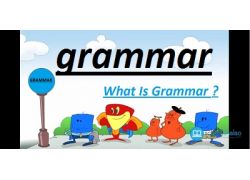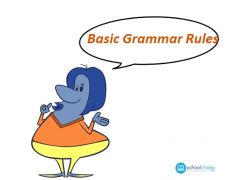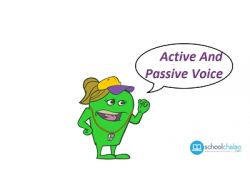Tutorial Library
Learning Point
Adverbs
Adverbs
Adverb is a word which modifies (gives more information about) a verb or adjective or other adverb.
For example,
He replied.
He replied quickly.
The word “quickly” is an adverb which gives more information about verb “reply” in the above example. The adverb “quickly” in above example tells us about the verb “reply” that the reply was given quickly or with no time delay.
Similarly an adverb may also modify adjective or other adverb or other part of speech except the noun.
Examples (adverbs modifying verbs).
He was driving carelessly.
John can speak French fluently.
They live happily.
Marry is laughing loudly.
He goes to school daily.
We sometimes get confused.
He met me yesterday.
Guests will come here.
Examples (adverbs modifying adjectives).
Note: The bold words (in following examples) are adverbs and the underlined words are adjectives.
It is a very difficult problem.
He is seriously ill.
This book is really nice.
The story of “crazy man” was truly funny.
You are too weak to walk.
Examples (adverbs modifying other adverbs).
Note: The bold word (in following examples) is an adverb and underlined word is the other adverb.
John drives very slowly.
He was talking too much angrily.
He ran fast enough to catch the bus.
They live very happily.
Formation of adverb
- Most of adverbs are formed by adding “-ly” to adjectives. For example, happily, easily, quickly, angrily, correctly, fluently, proudly, loudly, rapidly, immediately etc
- A few adverbs exists without “-ly”. For example, fast, slow, deep, far, hard, high, wrong, right, low, well, tight, straight, there, here, close, late, very, too, not
Examples.
|
Adverbs of Manner |
Adverbs of Place |
Adverbs of Time |
Adverbs of Frequency |
|
Happily |
Here |
Now |
Sometimes |
|
Sadly |
There |
Then |
Often |
|
Easily |
Near |
Yesterday |
Usually |
|
Rudely |
Somewhere |
Today |
Seldom |
|
Loudly |
Outside |
Tomorrow |
Frequently |
|
Fluently |
Inside |
Late |
Daily |
|
Rapidly |
Ahead |
Early |
Generally |
|
Angrily |
High |
Again |
Occasionally |
|
Greedily |
Top |
Tonight |
Again and again |
|
Wildly |
Bottom |
Soon |
Never |
Types/Kinds of Adverb
Adverb modifies verb by giving us the following information.
How the action occurs
Where the action occurs
How many times action occur
At which time the action occurs
Intensity of action
Adverbs are categorized on the basis of it information it gives, into the following categories.
- Adverbs of manner
- Adverb of place
- Adverb of time
- Adverb of frequency
Types of Adverb
Adverb modifies verb by giving us the following information.
- How the action occurs
- Where the action occurs
- How many times action occur
- At which time the action occurs
- Intensity of action
Adverbs are categorized on the basis of it information it gives, into the following categories.
- Adverbs of manner
- Adverb of place
- Adverb of time
- Adverb of frequency
Adverbs of Manner
These adverbs tell us that in which manner the action occurs or how the action occurs or occurred or will occur.
Examples.
She speaks loudly.
He was driving slowly.
You replied correctly.
He runs fast.
They solved the problem easily.
Listen to me carefully.
Adverb of Place.
Adverb of place tells us about the place of action or where action occurs/occurred/will occur.
e.g. here, there, near, somewhere, outside, ahead, on the top, at some place.
Examples.
He will come here.
The children are playing outside.
He was standing near the wall.
They were flying kites on the top of hill.
He lives somewhere in New York.
She went upstairs.
Adverb of time
These adverbs tell us about the time of action. e.g. now, then, soon, tomorrow, yesterday, today, tonight, again, early, yesterday.
Examples.
I will buy a computer tomorrow.
The guest came yesterday.
Do it now.
She is still waiting for her brother.
He got up early in the morning.
Adverb of frequency
Adverbs of frequency tell us how many times the action occurs or occurred or will occur.
e.g. daily, sometimes, often, seldom, usually, frequently, always, ever, generally, rarely, monthly, yearly.
Examples.
He goes to school daily.
She never smokes.
He is always late for class.
They always come in time.
Barking dogs seldom bite.
The employees are paid monthly.
The employees are paid every month.
Very Useful (0)
Useful (0)
Not Useful (0)
Please login to your account by completing this form
Reset Your password
Please enter the email address you signed up with and we'll send you a password reset link.
A reset password link has been generated and will be sent to you via email.
You can then follow that link and select a new password.
Completing that action will allow you to reset your password and then you can insert a new one.
Please enter the email address you signed up with and we'll send you a password reset link.
A reset password link has been generated and will be sent to you via email.
You can then follow that link and select a new password.
Completing that action will allow you to reset your password and then you can insert a new one.





